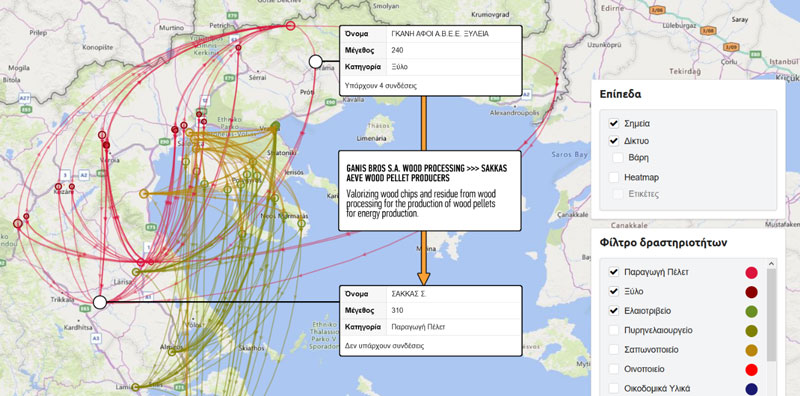by Theodore Dalamagas, Antonis Kokossis and Thanasis Gentimis (SymbioLabs)
SymbioLabs is working on the innovative concept of circular intelligence. Circular intelligence involves the application of business intelligence and big data technologies to drive profitable business actions in the circular economy. We provide digital solutions to collect and analyse data related to industrial facilities, waste production and supply chain economics, and detect geographic areas and industrial sectors to establish collaborative partnerships (networks of industrial symbiosis) to exchange materials, waste and energy for economic, environmental and social benefit.
The circular economy is an economic model that aims to retain the highest value and utility of products, components and materials at all time, based on sharing, reusing, repairing and recycling practices. It is an essential element to develop a sustainable, low carbon, resource-efficient and competitive economy in the face of increasing pressure for production and consumption, but with respect to the environment and the finite nature of natural resources. The circular economy mimimizes waste and encourages waste valorisation to extract secondary raw materials that can replace virgin materials in production processes. Circularity is an essential part of a wider transformation of industry towards climate-neutrality and long-term competitiveness. It can deliver substantial material savings throughout value chains and production processes, generate extra value and unlock economic opportunities. EC’s Circular Economy Action Plan [L1] is one the main blocks of the recently published European Green Deal, Europe’s new agenda for sustainable growth.
Digital technologies hold great potential for advancing the circular economy. SymbioLabs is working on the innovative concept of circular intelligence. Circular intelligence involves the application of business intelligence (BI) and big data technologies to drive profitable business actions in the circular economy. It is a suite of software and services to transform data into actionable intelligence and knowledge, supporting the creation of data value chains for the circular economy in several sectors: smart waste management and valorisation, energy efficiency, industrial symbiosis facilitation, and logistics optimisation for raw materials, waste and by-products.
Enabling the shift of heavy industry and production towards the circular economy presents a challenge. Industrial symbiosis (IS) [1] has been recognised as a key driving force to address this challenge and realise the circular economy. IS is an innovative approach to establish industrial collaborative partnerships (networks), exchanging materials and energy for economic, environmental and social benefit. In IS industrial networks, waste or by-products of one industry become the raw materials for another, allowing materials to be used in a more sustainable way.
Developing IS networks is a knowledge-intensive practice, where information is necessary to discover the potential of symbiotic connections between industrial material and energy flows. Therefore, the efficiency of digital solutions to support the facilitation of IS depends heavily on collecting, analysing and integrating highly diverse quantitative and qualitative data related to industrial material and energy flows.
In SymbioLabs [L2], we use a data-driven approach for the facilitation of IS. We are developing a digital platform to collect and analyse datasets relating to industrial facilities, regional waste production and supply chain economics with the aim to detect and visualise geographic areas and industrial sectors with high IS potential. Key datasets collected and imported in the platform are: (i) location and activity data of industrial facilities (e.g., location, magnitude, industrial NACE codes), (ii) input/output flow data of industrial facilities (e.g., based on life cycle inventory (LCI) data), (iii) waste production data (e.g., national statistical data), and (iv) data describing possible material/fuel substitutions (e.g., curated list of wastes that can replace raw materials in input flows).
By processing and analysing these datasets, we are able to detect potential symbiotic connections, i.e., potential exchanges of waste and raw materials among industrial facilities in a geographical region. Each symbiotic connection is weighted based on the distance between the industrial facilities (transport cost), the facility magnitude and the savings from the suggested exchange. Results are visualised on a map, indicating potential symbiotic conections and “hot spots” of IS regional synergies among industries.

Figure 1: Detecting potential symbiotic links in North and Central Greece.
We have already used our platform to detect potential symbiotic connections in various regions in Northern and Central Greece. Figure 1 shows the potential symbiotic links we detected (presented as arrows) among industrial facilities that produce pellet (in Greek: Παραγωγή Πέλετ), process wood (in Greek: Ξύλο) as well as olive oil mills (in Greek: Ελαιοτριβείο). These symbiotic links are detected based on the analysis of data relating to each industrial facility (e.g., waste production, production capacity, distance from other facilities). For example, wood processing facilities have a symbiotic potential with wood pellet production facilities, based on the fact that wood residue can be used for the production of wood pellets. In this sense, the wood processing company GANIS BROS SA (in Greek: ΓΚΑΝΗ ΑΦΟΙ ΑΒΕΕ ΞΥΛΕΙΑ), located in the city of Drama, has four detected symbiotic connections, one of which is with SAKKAS AEVE (in Greek: ΣΑΚΚΑΣ Σ), a pellet producing company in Central Greece.
About SymbioLabs
We build innovative digital solutions to support industries and policy makers in their transition to the circular economy model. We develop and provide digital tools and services for data analytics on material/resource data collections, decision support for waste valorisation, support a nd maintenance of industrial symbiosis networks, waste and by-product supply chain optimisation, and environmental footprint reduction. Founded in 2019, we are a spinoff company of ATHENA Research Center [L3] with leading expertise in big data analytics, knowledge engineering and machine learning.
Links:
[L1] https://kwz.me/h4e
[L2] https://www.symbiolabs.gr/
[L3] http://www.athenarc.gr/
Reference:
[1] Cooperation fostering industrial symbiosis: Market potential, good practice and policy actions, EU Publications, 2018.
Please contact:
Theodore Dalamagas, CTO
SymbioLabs, Greece










